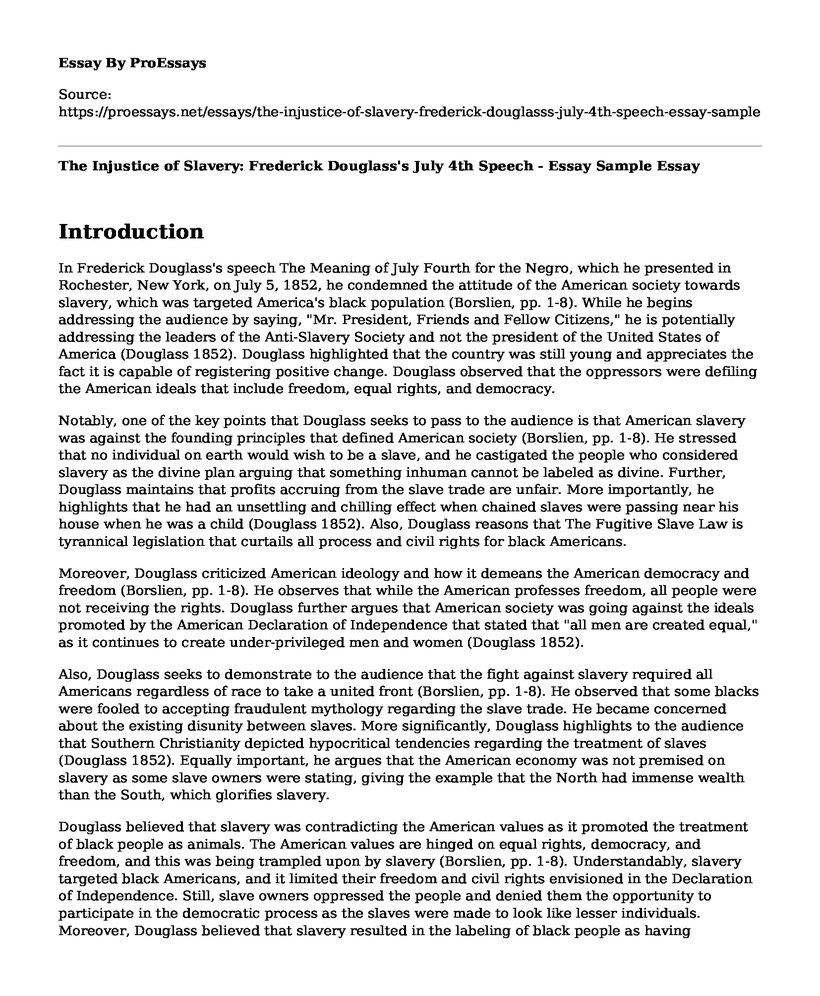Introduction
In Frederick Douglass's speech The Meaning of July Fourth for the Negro, which he presented in Rochester, New York, on July 5, 1852, he condemned the attitude of the American society towards slavery, which was targeted America's black population (Borslien, pp. 1-8). While he begins addressing the audience by saying, "Mr. President, Friends and Fellow Citizens," he is potentially addressing the leaders of the Anti-Slavery Society and not the president of the United States of America (Douglass 1852). Douglass highlighted that the country was still young and appreciates the fact it is capable of registering positive change. Douglass observed that the oppressors were defiling the American ideals that include freedom, equal rights, and democracy.
Notably, one of the key points that Douglass seeks to pass to the audience is that American slavery was against the founding principles that defined American society (Borslien, pp. 1-8). He stressed that no individual on earth would wish to be a slave, and he castigated the people who considered slavery as the divine plan arguing that something inhuman cannot be labeled as divine. Further, Douglass maintains that profits accruing from the slave trade are unfair. More importantly, he highlights that he had an unsettling and chilling effect when chained slaves were passing near his house when he was a child (Douglass 1852). Also, Douglass reasons that The Fugitive Slave Law is tyrannical legislation that curtails all process and civil rights for black Americans.
Moreover, Douglass criticized American ideology and how it demeans the American democracy and freedom (Borslien, pp. 1-8). He observes that while the American professes freedom, all people were not receiving the rights. Douglass further argues that American society was going against the ideals promoted by the American Declaration of Independence that stated that "all men are created equal," as it continues to create under-privileged men and women (Douglass 1852).
Also, Douglass seeks to demonstrate to the audience that the fight against slavery required all Americans regardless of race to take a united front (Borslien, pp. 1-8). He observed that some blacks were fooled to accepting fraudulent mythology regarding the slave trade. He became concerned about the existing disunity between slaves. More significantly, Douglass highlights to the audience that Southern Christianity depicted hypocritical tendencies regarding the treatment of slaves (Douglass 1852). Equally important, he argues that the American economy was not premised on slavery as some slave owners were stating, giving the example that the North had immense wealth than the South, which glorifies slavery.
Douglass believed that slavery was contradicting the American values as it promoted the treatment of black people as animals. The American values are hinged on equal rights, democracy, and freedom, and this was being trampled upon by slavery (Borslien, pp. 1-8). Understandably, slavery targeted black Americans, and it limited their freedom and civil rights envisioned in the Declaration of Independence. Still, slave owners oppressed the people and denied them the opportunity to participate in the democratic process as the slaves were made to look like lesser individuals. Moreover, Douglass believed that slavery resulted in the labeling of black people as having intellectual inferiority, which inadvertently reinforced racism in American society (Douglass 1852).
Undeniably, the meaning of the Fourth July would have significantly changed after the Civil War and reconstruction as the American society was more inclined to address the inequities that were caused by slavery. Worth noting is that Douglass was more concerned about how the American society glorified slavery and period after slave trade resulted in an environment where the American ideals such as democracy and equal rights were reinforced, and this would have solved the challenges highlighted by Douglass. More importantly, the reconstruction period was characterized by improved democracy, and this resulted in great changes in America's political climate.
Works Cited
Borslien, Sharine. "Frederick Douglass: What to the Slave is the Fourth of July?: An Analysis." 2013, pp. 1-8
Douglass, Frederick. "What to the Slave is the Fourth of July?" National Portrait Gallery. 1852. http://teachingamericanhistory.org/library/document/what-to-the-slave-is-the-fourth-of-july/
Cite this page
The Injustice of Slavery: Frederick Douglass's July 4th Speech - Essay Sample. (2023, May 22). Retrieved from https://proessays.net/essays/the-injustice-of-slavery-frederick-douglasss-july-4th-speech-essay-sample
If you are the original author of this essay and no longer wish to have it published on the ProEssays website, please click below to request its removal:
- Reflective Essay on My Experience With Social Media Addiction
- Research Paper on Physical Child Abuse
- Out of This Furnace: the US Economy in the Period Between 1880 to 1920 Essay
- Essay Sample on Internet Addiction as a Medical Condition
- Media Psychology: Understanding Human-Media Interactions - Essay Sample
- Essay Sample on Lyndon B. Johnson & Cold War: Vietnam War & US Foreign Policy
- Animal Testing: Pros & Cons of a Controversial Practice - Essay Sample







